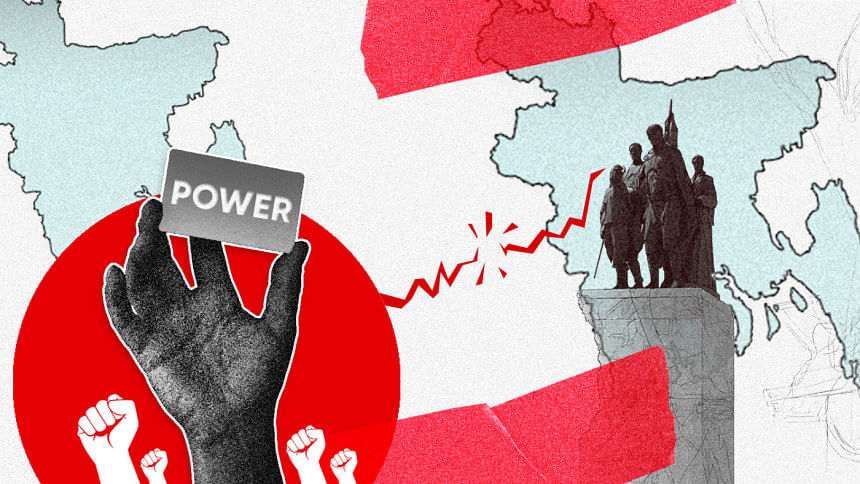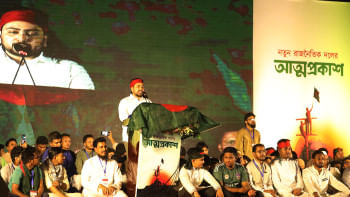What recent scandals reveal about student activism and our politics

There is something painfully ironic when those providing leadership to a movement, built on the premise of justice and reform, become the subject of criminal investigations. That irony is now manifesting in the public sphere as multiple individuals associated with Bangladesh's recent anti-government student platforms—particularly the Anti-Discrimination Student Movement (SAD), Bangladesh Ganatantrik Chhatra Sangsad (BGCS), and the political camp National Citizen Party (NCP)—face serious allegations of extortion, impersonation, and criminal misuse of power. The accusations are not just isolated headlines; they speak to a deeper, structural pattern that has historically tainted Bangladesh's student and political activism. The past, it seems, is catching up with the present once again.
The shocking episode unfolding in Dhaka's Gulshan neighbourhood has cast a long shadow over these platforms. Five individuals, including prominent student leaders, were arrested for allegedly demanding Tk 50 lakh from a former ruling party MP. Police say they were caught in the act of collecting a second instalment, after allegedly receiving Tk 10 lakh already. The implications go far beyond a single extortion case. In the days that followed, more complaints surfaced across the country: coordinators, organisers, or self-declared activists tied to the July movement allegedly using their newfound political capital to engage in extortion, intimidation, and even sexual violence.
For movements that once championed equality and accountability, these developments are not just reputational blows—they are existential threats. As various leaders scramble to issue statements, suspend local committees, and distance themselves from the accused, the public is left wondering: how did we get here? More importantly, what does it say about the nature of political transitions and grassroots mobilisations in Bangladesh?
Political activism in this country, especially at the student level, has always been a double-edged sword. On the one hand, students have played a historic role in shaping national discourse—from the Language Movement of 1952 to the anti-Ershad protests of the late 1980s. But on the other, student wings of political parties have often devolved into hubs of patronage, muscle power and, frequently, corruption. As such, when a movement like SAD emerged with a focus on inclusive democracy and citizens' rights, it was seen by many as a refreshing break from the entrenched party politics that dominates university campuses and civil discourse.
But idealism, no matter how noble, is not immune to co-option.
What we are witnessing now is the familiar pattern of transformation: a moral crusade turning into a power mechanism, and then eventually into a money-making enterprise. In many ways, it mirrors the lifecycle of movements globally, where momentum and mass mobilisation attract not only the idealists but also opportunists. Once a movement grows powerful enough to influence public narrative or policy, it becomes a magnet for those seeking leverage—access to power, favours, money or prestige. The difference lies in whether the movement has internal safeguards, a culture of transparency, and structural accountability to prevent its degradation.
Clearly, in this case, the structures were either absent or grossly inadequate.
The fact that student activists were able to demand ransom, pose as law enforcement officials, and infiltrate high-profile networks suggests not just personal greed but systemic vulnerability. In the aftermath of the Gulshan scandal, former spokespersons and prominent figures from the movement have come forward to say they had long sensed the rot within. Allegations of internal harassment, threats, and coercion were previously raised but never acted upon. If that is true, then the current outrage must be tempered with a dose of self-critique: were these organisations too eager to expand, too reliant on symbolic unity, too dismissive of warning signs?
Even more troubling is the reaction from some of the organisations' leadership, which appears focused more on damage control than soul-searching. Announcements of suspensions and promises of zero tolerance, while necessary, feel inadequate in the absence of genuine institutional reform. When the BGCS or NCP speaks of spontaneous committee formations and lack of screening during the movement's peak, they unintentionally underscore how a powerful civic force has been allowed to operate without internal checks. In their eagerness to harness discontent and mobilise youth, structure was sacrificed for speed, and ideology for expediency.
But perhaps we are expecting too much from student-led movements in a broader political environment that rewards power over principles. In a country where criminal cases are often filed and withdrawn based on political alignments, and where the phrase "coordinator" can grant access to government offices and police stations, it's not surprising that ambitious individuals, regardless of ideology, would be tempted to exploit their roles.
When political movements fail to institute clear disciplinary mechanisms, the vacuum is filled by those looking to game the system. Without visible legal repercussions, organisational punishments like suspensions carry little weight. And that may as well apply to Bangladesh's entire political architecture, not just to student platforms.
Indeed, what we are seeing now is not a student problem; it is a political culture problem.
The current situation is eerily reminiscent of the cycles described by philosophers like Friedrich Nietzsche as well as political historians. Power, when acquired without transformation of ethos, simply transfers the tools of oppression from one hand to another. Nietzsche warned, "He who fights with monsters should be careful, lest he thereby become a monster." In Bangladesh's context, one might ask whether those who fought for justice and democracy last year are now becoming what they opposed: a new elite with old habits.
This is not to say that the entire movement is tainted—far from it. Many who were involved continue to push for meaningful reform, justice, and civic empowerment. But the credibility of such efforts now depends on how seriously the movement and its offshoots treat this crisis—not as a PR disaster, but as a moral reckoning.
The silence—or worse, deflection—of some political actors risks reinforcing the public's growing cynicism. When citizen-led movements start to mirror the very systems they sought to reform, people begin to lose faith not just in politics, but in the possibility of change itself. That is the real tragedy. Because when good people grow disillusioned, the space is ceded to those who thrive in chaos.
Bangladesh cannot afford that. The country's youth have long been both its conscience and its catalyst for progress. But they have also been weaponised by those in power, too often. Each wave of student activism has brought hope, and later disillusionment. The lesson is not that youth movements should be abandoned. The lesson is that they must mature institutionally and morally, even as they grow politically.
Perhaps it's time to rethink how these movements evolve from protest to politics. Can a movement be built on democratic values if its internal operations are opaque and hierarchical? Can it claim to represent the people if it does not vet its own representatives? Can it pursue justice without upholding it within?
The stakes are too high to allow these questions to remain rhetorical.
Bangladesh stands at a juncture where public anger at governance failures coexists with deep suspicion of new political actors. That is a dangerous equilibrium. For true transformation to occur, it is not enough to change slogans or swap out faces. As history has shown—from the French Revolution to the Arab Spring—if movements don't reform themselves from within, they are destined to repeat the failures of those they replaced.
Political capital, once spent on coercion and corruption, rarely regenerates. It dissipates, leaving behind apathy and anger. And in that vacuum, authoritarianism finds fertile ground.
The crisis unfolding today is not just a test of individual guilt or innocence. It is a referendum on the integrity of the very platforms that once promised a new political dawn. If these movements are to survive and remain relevant, they must act swiftly—not only to punish wrongdoers, but to reform themselves. That means introducing transparency, democratic accountability, and, above all, a renewed commitment to the values that first brought people to the streets.
Because in the end, it is not the protests that matter—it is what comes after.
H.M. Nazmul Alam is an academic, journalist, and political analyst. He can be reached at [email protected].
Views expressed in this article are the author's own.
Follow The Daily Star Opinion on Facebook for the latest opinions, commentaries and analyses by experts and professionals. To contribute your article or letter to The Daily Star Opinion, see our guidelines for submission.

 For all latest news, follow The Daily Star's Google News channel.
For all latest news, follow The Daily Star's Google News channel. 






Comments